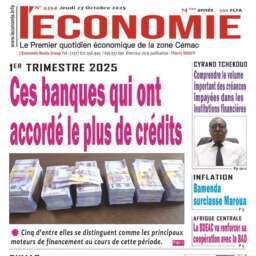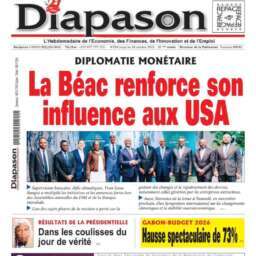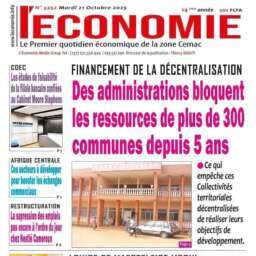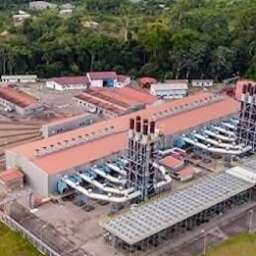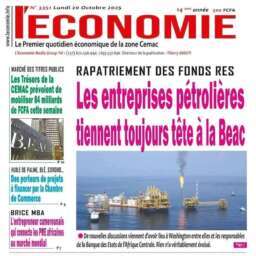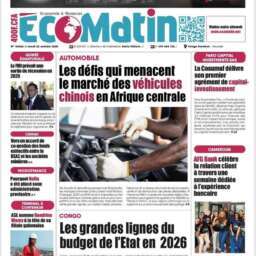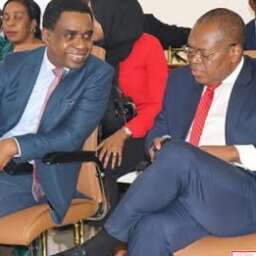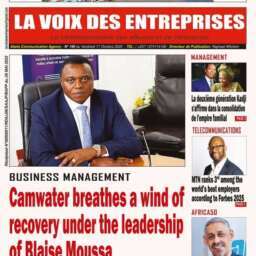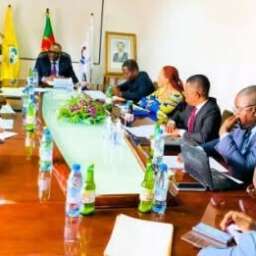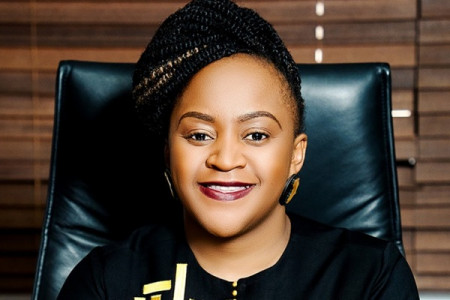(Business in Cameroon) – In recent weeks, mobile telecommunications services in Cameroon have experienced a noticeable decline in quality. In a statement released on September 11, 2024, the telecom regulator, ART, attributed this issue to the “continuous degradation” of the national fiber optic network and called for a reevaluation of the network’s maintenance practices. In an exclusive interview with Business in Cameroon, the CEO of MTN Cameroon echoes these concerns. She expresses alarm over the increasing frequency of fiber optic outages and proposes solutions for improved management of this critical infrastructure, currently overseen by state-owned Camtel. Beyond the network issues, she also discusses the company’s strong financial performance since taking the helm in September 2022, despite a temporary freeze on MTN Cameroon’s bank accounts due to a legal dispute with firms connected to Cameroonian businessman Baba Danpullo. Drawing on her decade of experience within the MTN Group, the CEO outlines the potential implications of the legal battle on MTN’s operations in Cameroon. She also explores the potential impact of Starlink’s entry into the country’s telecommunications market. Finally, the CEO provides an update on MTN’s ongoing investments in Cameroon and its plans for the rollout of 5G technology.
Upon assuming your position as CEO in September 2022, you expressed the ambition to exceed more than 50% market share and over 10 million subscribers that MTN Cameroon claimed as of December 31, 2021. Two years later, where do you stand?
Looking back at the last two years, it’s been an exciting journey for MTN Cameroon, and for me personally, an opportunity to understand Cameroon as a country, its people, and its business environment. I’m proud to see how far MTN Cameroon has come over the last two years.
I remember coming into the country two years ago, and as you said, the ambition was to ensure that MTN Cameroon remains a market leader with more than 50% of the market. I’m happy to share that we remain a market leader. Ending the first half of the year, in terms of both customers and value, we are above 50%, which is something we’re extremely proud of. In terms of our top-line revenue, last year we grew the business by about 12 percent year on year. This growth comes not only from the traditional services of voice and data but also from significant growth in mobile money.
This is a trend we’ve continued to see into 2024 and expect to continue into 2025 and beyond. It’s been a great performance from the business, which we believe represents sustainable growth not only for 2024 but for the future as well.
In 2023, MTN Cameroon’s revenue reached nearly 326 billion FCFA. The profit before tax amounted to 123 billion FCFA, representing nearly 38% of the revenue, the best margin since 2019. The shareholders must be proud of you. How did you achieve this result?
It’s been a very interesting journey, and I owe a lot of that performance to the team at MTN Cameroon. They’ve done exceptionally well. A couple of things explain how we’ve managed to grow the EBITDA and profit margins. First, as you mentioned, is the top-line revenue growth. To improve margins, you must grow the top line. We’ve seen considerable growth, not only in the core business but also in areas like data. With the adoption of internet services across the country, data has grown by at least 20% every year for the last two years, and we’re seeing similar growth for 2024.
Beyond internet revenue growth, we’ve also seen significant growth in mobile money. It’s our fastest-growing area, explained by the demand for these services. Our Mobile Money Corporation subsidiary serves over 5 million people monthly who transact on the platform.
We’re also very thankful to the team and stakeholders for improving business efficiency. It’s one thing to grow top-line revenue, but if our cost profile isn’t right, we dilute the margins. Our shareholders are happy because they see discipline around cost, operations, and ensuring no wastage. All this is to deliver a healthier and more sustainable business for the future.
Between June 2022 and June 2023, MTN Cameroon recorded the best performance among MTN’s subsidiaries in Francophone Africa, even surpassing Côte d’Ivoire, which has more subscribers. Additionally, there was a 17% growth in operating margins in Cameroon. Can we say that Cameroon is now a real growth driver for MTN in Francophone markets?
Absolutely! In the recently released Half Year Results of the MTN Group, our Group President and CEO, Ralph Mupita, even highlighted Cameroon as a market of major focus for development and growth. This to me is for several reasons.
Cameroon remains a very interesting investment case for private sector players. Our inflation rates, while they have increased, are still relatively stable compared to the region and other countries across the continent. Our currency, pegged against the euro, remains relatively stable compared to some markets pegged against the dollar. These micro indicators make Cameroon an attractive market.
Moreover, Cameroon has significant potential in terms of market opportunities, resources, and the entrepreneurial spirit of its people. Our young population represents the leaders and high-value customers of tomorrow. All these indicators point towards Cameroon being a very attractive market for investment.
When MTN Group sees good results from Cameroon over the last two years, it makes us proud to be a huge potential market for future growth, not only for MTN in Cameroon but for MTN Group as a whole. This potential extends beyond just our company to the broader economic landscape of Cameroon.
These performances seem all the more exceptional as they were achieved in a particular context. Just a few days after you took over as head of MTN Cameroon, the company’s accounts were seized by the judiciary at the request of companies linked to the Cameroonian businessman Baba Danpullo. How did you manage to keep the company running and achieve such results?
It’s been quite challenging over the last two years, despite it having been an exciting period. I owe our success to the fighting spirit of the MTN Cameroon team. When this incident happened two years ago, no one could imagine we’d be where we are today. It has been two years without resolution of this matter, but I want to thank the team, board, and all stakeholders who’ve supported us thus far.
Regarding the legal case, as we’ve said before, it doesn’t involve MTN Cameroon at all. This matter is between Bestinver and some companies that are completely unrelated to us. We’ve maintained our position – MTN is a responsible corporate citizen and has nothing to do with this case.
To ensure business continuity, we’ve tried to separate the legal issues from business operations because we understand our role in Cameroon. Irrespective of what’s happening, we still have the responsibility of delivering connectivity services to almost 13 million people who depend on us for calls, money transfers, internet access, and more.
We’ve clearly separated the legal front from business operations. We draw our confidence from knowing that we have nothing to do with this case, so we continue to deliver on our mandate without being derailed. Has it been a distraction to the business? Yes, it has been a major one. But we’re confident and hopeful that our legal position will be proven correct, and we look to the justice system to see this case through to a more positive conclusion for MTN.
In your interactions with the authorities, you have often highlighted the negative consequences this case could have on the sustainability of MTN’s activities in Cameroon. Do your results somewhat temper these concerns?
I would hope not. Irrespective of what’s happening to MTN as a corporate entity, we know we still have the obligation to deliver our services to consumers. Our priority has been to never compromise the services we deliver or the integrity of customers’ mobile money wallets. We’ve focused on this, and as a result, our customers have shown confidence by remaining loyal to our network, which has allowed us to sustain the business.
Through our various stakeholder engagements with authorities across different arms of government, I think there’s a general understanding that in the private sector, especially with committed corporate citizens like ourselves, certain things need to be established as a level playing field. One of these is the justice system. As I mentioned earlier, we’re confident that with time, the truth of the matter will come to light and be concluded in a manner acceptable to all parties.
We remain committed to Cameroon and to delivering our services, regardless of the challenges we face. Our focus continues to be on our customers and maintaining the quality and reliability of our network and services.
In business circles, this dispute is perceived as a degradation of the risk associated with private investment in Cameroon. Is this also MTN’s perception? Could this case eventually lead the group to reconsider its presence in the country?
MTN has been in Cameroon for 24 years, with our 25th anniversary coming next year. That’s not a short period. We consider ourselves a citizen of Cameroon. Our Group President often speaks about MTN’s positioning on the continent as the only telecom brand of our size that is born of Africa for Africa. We’re not going anywhere. Africa is our continent, and Cameroon is our country.
Of course, we’d like things to work out better than they have in the past. But I often tell my team: if MTN isn’t going to be an active participant on the continent in delivering digital solutions for Africa or in Cameroon, then who will? We’re here as Africans for Africa, and as Cameroonians for Cameroonians, because we want to see the industry develop and grow.
Will there be challenges? Yes. Has this Bestinver case been a challenge? Absolutely. But is it enough for us to leave Cameroon? Absolutely not. We remain confident that our history with Cameroon and the future we’ve positioned to stakeholders is enough to resolve matters that come along the way, including this Bestinver case.
Have the company’s good results since your arrival been reflected in MTN’s social action in Cameroon? How much have you dedicated to it in two years? And, briefly, what actions have you taken and why?
Community development is extremely important for MTN. We derive our license to operate not only from regulators but also from the communities we serve. The MTN Foundation was established to focus solely on community development, dedicating 1% of our profits to these projects.
Our improved performance over the last two years has allowed us to contribute more to the Foundation. We’ve dedicated about 350 million francs per year, totaling around 1 billion francs for 2022-2024. These projects focus on four key themes: education, youth empowerment, health, and Cameroon’s national priorities.
Notable projects include MTN Kawtal, which aims to include people with disabilities by making our products and services more accessible. We’ve also run education programs in collaboration with the Ministry of Secondary Education.
Recently, we’ve started partnering with other private sector companies through the One Goal Alliance. We realized many of us were running similar projects, so we decided to pool our resources for greater impact. Partners include IHS, UBA, Huawei, Dangote, Chanas Assurances and MW, among others.
This collaborative approach allows us to make a bigger impact in education and other areas. While we’ve invested about 1 billion francs up to 2024, we expect to see even more investment in the future through these partnerships. It’s an exciting development that makes me proud of our community engagement efforts.
Days ago, a consumer association asked the Government to sanction MTN Cameroon and the other Operators for the poor quality of service. Early last year, several subscribers expressed their dissatisfaction through the movement called “airplane mode,” denouncing the quality of service and high prices. How do you manage to satisfy both shareholders and subscribers?
At MTN, our primary focus is our customers, as they are the foundation of our company. We’ve prioritized accessibility for customer feedback, especially following the “Mode Avion” incident last year.
Firstly, regarding pricing and affordability, we constantly seek improvements as we scale. While we need to charge for services to maintain quality and drive innovation, we’re always exploring ways to reduce costs. Over the past two years, we’ve managed to decrease our data pricing by more than 15%. We’ve also introduced new services like MTN No Limit, designed for home users with higher usage needs at more affordable rates.
We recognize that consumers are increasingly aware of service standards, and it’s our responsibility to meet these expectations. In response to the “Mode Avion” incident, we swiftly committed to significant network investments. We’ve pledged about 30 billion XAF annually to expand and enhance our network quality.
The technology sector demands continuous investment to keep pace with changing consumer patterns. We’ve made this long-term commitment to both the authorities and the people of Cameroon. However, we face external challenges, such as power instability, which affects our service quality. To address this, we’re investing in alternative power sources like solar and generators, while also engaging with entities like Eneo to secure more reliable power supply.
Another significant challenge is our reliance on a third-party for fiber for cross-city interconnectivity. We’ve experienced an increase in fiber cuts due to various factors. We’re actively collaborating with partners to stabilize this critical infrastructure.
Quality of service remains at the top of my agenda as CEO and is a primary focus for the entire MTN team. For factors within our control, we assure our customers that comprehensive plans are in place for continuous improvement. For external factors, we maintain ongoing engagement with authorities to ensure we receive the necessary support to enhance our service quality.
Our commitment to Cameroon extends beyond just providing services. We’re dedicated to overcoming challenges, both internal and external, to deliver the best possible experience to our customers while contributing to the country’s technological advancement.
In 2023, revenues from fintech services saw an increase of nearly 44.5%, attributed in part to a gradual rise in service costs over the years. Do you intend to maintain this trajectory? If so, how will you address potential concerns regarding the impact on financial inclusion, which these services are also designed to support?
The journey of Mobile Money has been fascinating. As I mentioned earlier, it’s one of MTN Cameroon’s fastest-growing business lines, not just because of costs, but due to its widespread adoption in the country. Financial inclusion is a major priority for us, and we’re striving to make it as affordable as possible for consumers.
That said, the mobile money ecosystem does involve some costs. Consider the agents you see on the street, sitting under umbrellas or in kiosks. For every transaction they perform, they earn a commission. So there needs to be a fee to cover that cost.
In the mobile money environment, we don’t look at individual services and their specific fees. Instead, we consider the overall package we’re offering consumers. We constantly balance between various services. While we charge fees for person-to-person transfers or retail transactions, you’ll find that payments for utilities like Eneo or Camwater are completely free.
We’re always looking for ways to make our services more accessible and affordable. We recognize that mobile money serves a financial inclusion need that traditional banking services often don’t address. We don’t anticipate continuously increasing prices. In fact, as we grow and more people adopt the service, we expect to optimize fees in favor of consumers over time.
However, this will also depend on how our cost profile evolves. We want to ensure we maintain a certain quality of service for our customers, which means covering our operational costs through fees. It’s something we constantly reflect on because our goal is to see every Cameroonian owning a mobile money account, enabling them to conduct financial transactions easily.
At the beginning of last year, the TRB (Regulator) announced that Camtel, Orange, and MTN had committed to investing 156 billion FCFA in 2023 to carry out “priority actions” to address the deficiencies identified during the performance checks of your networks, organized in the second half of 2022. How much was MTN’s commitment?Has this commitment been fulfilled? If so, what concrete achievements have been realized?
Absolutely. As I mentioned, the industry collectively announced 150 billion last year, and MTN’s share of that was 30 billion. This is solely for the network. When I talk about these investments, there are many other areas we invest in, such as mobile money, IT platforms, and the distribution environment. But specifically for the network itself, we committed and invested 30 billion last year. We’re planning a similar amount for this year as well.
On August 26, 2023, during a meeting with Prime Minister Joseph Dion Ngute, the CEO of the MTN Group announced that the Cameroonian subsidiary plans to invest over $200 million (more than 120 billion FCFA at the current exchange rate) in technology and network services over the next three years. Additionally, $25 million (over 15 billion FCFA) will be allocated to enhancing fintech activities through its subsidiary, Mobile Money Corporation. Does this investment plan also encompass the commitments made to the regulator? Furthermore, what is the current status of its implementation?
When a Group President makes such a statement, you can be sure it’s a commitment that will be honored. As our group president said last year, the plan was to invest at least $225 million in Cameroon over three years, covering 2023, 2024, and 2025. We’re well on track with that investment profile.
About $60 million was already integrated into last year’s network plan. We’re looking at a similar amount this year, including investments in our IT environment. As you know, technologies are evolving rapidly, with the advent of things like AI, so we’re keen to see that environment mature within MTN as well.
You’ll see the balance coming in 2025, where our ambition is not only to improve quality but also to expand aggressively into various regions in terms of connectivity. So we’re well on course to honor that $225 million commitment.
Early last year, you expressed the ambition to position MTN the first 5G operator in Cameroon. What actions have already been taken to achieve this ambition, and when do you anticipate its realization?
I think there isn’t any hindrance, first and foremost. It’s important to clarify that. In the natural evolution of technologies, certain things need to be in place before we can launch any future technology. This was the case with 3G, 4G, and now with 5G.
The first thing that must happen for technologies like 5G to be deployed is that the regulatory framework must be ready. I’m really pleased with the progress we’ve been making as an industry, under the leadership of Her Excellency, the Minister of Post and Telecommunication. We’re working on studies about the framework for 5G, its use cases, and so on, which will create a platform for a fully established regulatory framework.
This work is ongoing, and MTN is contributing to it under the ministry’s leadership. Once it’s concluded, it’ll open the door for future technologies like 5G in Cameroon. Meanwhile, within MTN Cameroon, we’re ensuring our network is ready for upgrades like 5G. This year, we’ve undergone a significant network modernization, making it 5G-ready. So when the regulatory frameworks are complete and licenses obtained, activating 5G will be much easier.
We’ve also been engaging with the ministry about potential 5G experimentation. Of course, we’ll only proceed when the appropriate approvals happen. So on one hand, we’re actively participating in the regulatory preparation, and on the other, we’re preparing technically to ensure that once the regulatory framework is ready and approved, we can bring this significant milestone to Cameroon with the delivery of 5G.
From what you’re saying, the deployment of a 5G network seems to still be a long way off…
It really depends on the prerequisites, as I mentioned. For any country evolving technologies, whether 4G or 5G, the main step is the readiness of the regulatory framework. I believe the authorities are working on this. In time, it should be something we can celebrate as an industry – a milestone for Cameroon.
The quality of digital services currently depends on the development of the fiber optic network. In Cameroon, the state has chosen to entrust this responsibility exclusively to the public company Camtel. Without questioning this sovereign decision, what can be done to ensure that this infrastructure meets current needs?
I think one thing that has worked well in Cameroon’s industry is the collaborative platform between all concession holders. Many challenges and opportunities are discussed there. As you said, it’s a sovereign decision which must be respected. At the same time, we at MTN, like many other companies, bring experiences and expertise from other parts of the continent to improve fiber infrastructure delivery models in the country.
We are at the same time, very concerned by the number of fibre cuts that we are experiencing in the industry. In August alone, we saw the highest level of instability on fibre which directly impacts our ability to deliver quality service to our customers. Our approach involves close engagement with Camtel on managing current challenges but also planning for the future. For instance, with fiber cuts, we ensure good operational coordination between us and Camtel. Are there challenges? Yes, but there’s continuous improvement in resolving operational issues as they arise.
Without speaking out of turn, we’re also exploring opportunities for deeper collaboration beyond using fiber for transport, looking at how we can expand fiber delivery to entities, while respecting existing rules and regulations. We’ve positioned ourselves at MTN to be an open and collaborative partner, working together to better serve Cameroonians, all within the framework of current laws.
The rupture of several submarine cables last March revealed the vulnerability of optic fibre connectivity infrastructures, highlighting the dependence of many countries and companies on these cables for stable internet access. In this context, how do you perceive the emergence of Starlink, the satellite connection service developed by SpaceX?
I see the delivery of connectivity services as not “either/or” but “and/and”. These technologies are complementary to one another. At the MWC conference earlier this year, there was discussion about whether one operator can serve the world’s demand for connectivity. The consensus is that various technologies will be needed to meet both current and future demands.
I view satellite technology, not just Starlink but satellite in general, as complementary to the radio and fiber connectivity we provide in-country. What’s crucial for us as an industry is ensuring harmony in how these services are delivered to end consumers.
We have established operators today, and new operators entering various countries. It’s important that there’s a collaborative effort to ensure the consumer ultimately benefits. That’s why you see operators like MTN Group signing agreements with satellite providers. You’ll likely see more of these collaborative approaches at a group level which, local regulation permitting, would also benefit Cameroon.
MTN’s stance is that we see these technologies as complementary, and we’re open to collaboration. Our goal is to deliver better, richer services to consumers. Satellite, for example, has the potential to reach very rural areas where radio networks haven’t yet penetrated, which presents collaborative opportunities. We look forward to seeing how such collaborative efforts could come into play in Cameroon.
In conclusion, what are the prospects for MTN in Cameroon?
I can’t conclude the interview first and foremost without saying a very huge thank you to all customers of MTN. I really value and appreciate their loyalty and the patronage of MTN, and I appreciate that the last two years have not been easy, but at the same time, they’ve been exciting, they’ve been engaging, and we owe everything that we have honestly to the consumers that we have today of the MTN services. I’d also like to say a huge thank you to all the stakeholders that I’ve had the pleasure of interacting with, whether it’s from the ministries to the regulators to the presidencies, officers.
There’s been a huge support in MTN’s ability to deliver the kind of service but also to deliver the kind of value that we have to our shareholders. And to both of these, our stakeholders and our customers, we as MTN and I as Mitra can only commit to doing even more over the next few years. We expect to see a lot more coverage expansion from MTN. We are happy that we cover 97% of the population, but at the same time, we’re not happy that we don’t cover 100.
So we’re in the pursuit of 100% population coverage, which will come with time. And beyond that, customers can expect an honoring of the commitment around continued improvement of quality of service. It’s not just about expanding the coverage, but it’s about delivering a quality of service that our consumers deserve. And beyond that, customers can expect continuous innovation from MTN. We’ve spoken about mobile money and how that has grown. A lot more products and services coming out of that, some of which are also going to be launched before the end of the year.
And when we talk to our enterprise customers also, a lot of interesting deals and solutions that have been delivered in the last two years, but a lot more innovation that our enterprise clients can also expect going forward. And beyond that, I think like I mentioned earlier, while we’ve invested almost 1 billion in community development over the last two years, plus 2024 being the third year, I think the population and the communities of Cameroon can expect continued and even more corporate social investments from MTN.
Interview by Aboudi Ottou





